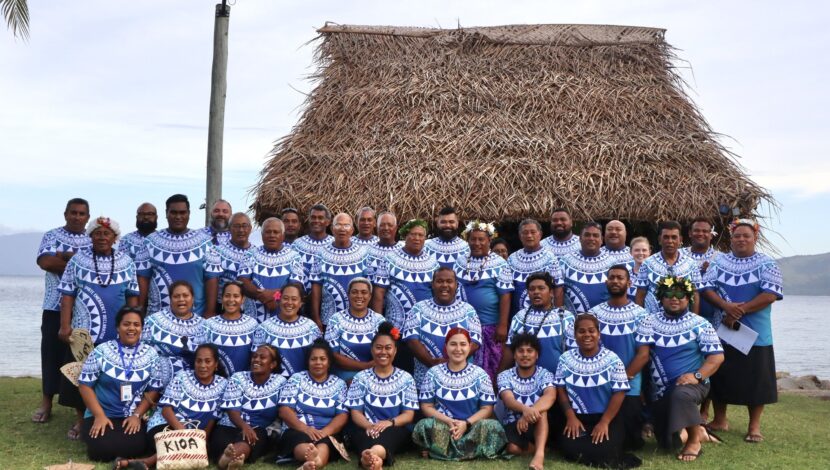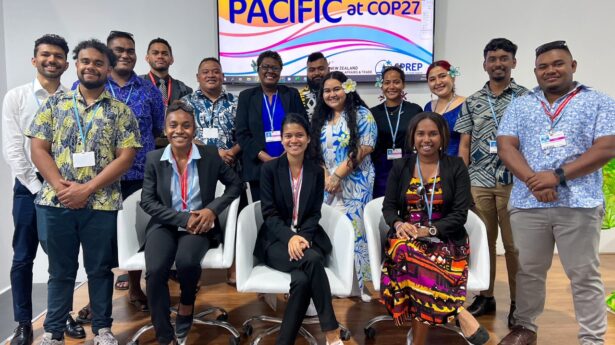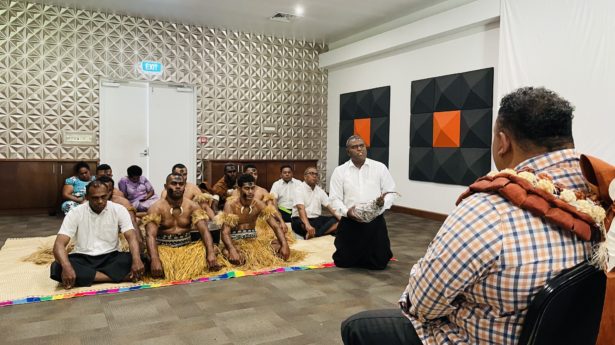The Unitarian Universalist Service Committee advances human rights through grassroots collaborations.
Partner Spotlight: KICO

By Deanna Johnson on November 10, 2022
The Kioa Island Community Organization (KICO) is dedicated to addressing the complex issues faced today by the members of the Kioa community and the Pacific region as a whole. The organization was founded in 2015 as, “an organization driven by progressive ideas, bold actions, and strong foundation of support.”
This week, KICO has joined six other UUSC partners in attendance at COP27. While at the conference, the organization will engage in critical conversations in support of Pacific Islanders. Moreover, KICO will continue advocating for international actors to sign on to the Kioa Climate Emergency Declaration developed in October 2022.
KICO at the Start
Kioa island is located within Fiji, just east of Vanua Levu, the country’s second main island. In 1947, the Matai people of Vaitupu, Tuvalu settled on the island after purchasing it with money earned from the American Armed Forces during World War II. When the Matai arrived on the island, they brought with them their culture and ancestral legacies which they passed on to future generations and which are still practiced today.
However, living within a small island developing state (SIDS), like Fiji, comes with acute challenges as the global temperature grows warmer and sea levels rise. In the years since the purchase of Kioa, six separate islands of the nearby Solomon Islands have completely disappeared due to rising sea levels, portending a grim fate for the rest of the region. Moreover, in Vanua Levu, water levels “are now reaching homes during high tide,” endangering the houses, lives, and cultural heritage of its residents.
In witnessing these terrifying developments, the community members of Kioa came together to form KICO to protect the intangible items that are lost in the face of climate change—language, culture, history—as well as to unite the voices of Fijians and neighboring Pacific Islanders who are calling out wealthy countries who directly contribute to climate destruction with impunity.
KICO Today
Today, KICO aims to address four key issues faced by Kioans: climate change-induced displacement, food security, water security, and women’s historical exclusion from business. Since 2021, KICO has partnered with UUSC to provide Kioans with training in the latest climate-tolerant planting techniques of coconut, kava, taro, cassava, and sandalwood while also working with Kioan women to increase their business skills related to virgin coconut oil production.
Through these activities, KICO supports Kioans in building resilience and capacity to protect their homes and lives. Moreover, KICO’s structure as an organization completely led by Kioans ensures that the practices implemented and the lessons taught through its programming are sustainable, appropriate, and expertly address the unique needs of Kioa. Moreover, with the support of UUSC, Kioa has now developed a formal strategic plan, guiding the direction of the community’s future.
Kioa Climate Emergency Declaration
On October 19, 2022, following a two-day regional talanoa (“conference” in Fijian) of Pacific civil society organizations, a climate declaration was released. The declaration, which seeks to ensure, “a just and dignified legacy for our families and future generations,” demands a series of actions from international leaders.
The specific demands are summarized as follows:
- Increase action in reducing greenhouse gas emissions by abandoning fossil fuels and reducing emissions at their sources to meet the 1.5°C temperature goal and ensure survival of small island communities.
- Finance and support community-led adaptation initiatives.
- Institute urgent responses to loss and damage through the creation and expansion of financing schemes, working groups, and task forces.
- Ensure the just and dignified movement of peoples through community-informed and consultative policy action and the use of datakeeping technology.
- Guarantee access to equitable financing arrangements with inputs from civil society and other stakeholders
- Develop and enforce ocean policies that are compatible with climate goals.
- Cancel climate debt and commit to a debt-free future.
The declaration also features the stories of six Pacific communities who have faced non-economic loss and damage at the hands of extractive industry and climate induced disaster. KICO and fellow Pacific civil society groups will continue presenting the declaration to international governments for signature.
Learn more about how climate change is affecting Pacific islands and take action:
Image Credit: Kioa Island Community Organization

